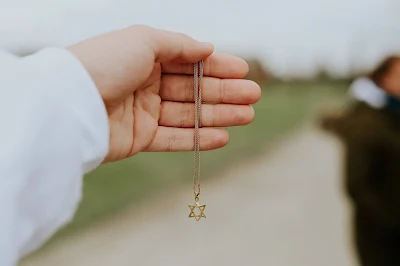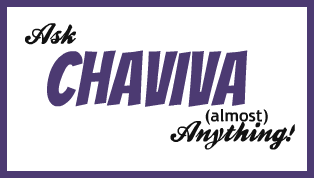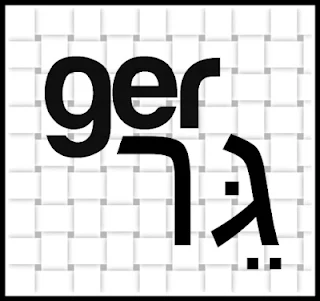I don't know where to begin this blog post.
I feel violated, torn, and like the institution that I've always taken such great pride in being a part of -- journalism -- really let me down. Someone I worked with ages ago at The Washington Post decided to write an article about me, my conversion, and the tumult I was in while I was dating a non-Jew during my out-of-body experience in late 2011/early 2012. After I broke up with said non-Jew and focused all of my energy on tons of
teshuva and then
aliyah, I found out the article was being updated and finally going to print. So there was updating, fact checking, and all of that jazz.
Then the article came out.
For the first time since my marriage collapsed, I'm heart broken. Truly heart broken.
So I'm not posting it here, and I'm going to ask that if you
have read the article also not to post it here. In my opinion, it amounts to
lashon hara, a lack of fact checking, and a tone that is bad for converts.
Also? It contains some of
the most personal information about my life that I've never blogged about, for good reason. I don't know why I thought it was a good idea to share the intimate details of my upbringing. But one friend put it appropriately: The writer abused my intimacy.
There are a few blatant errors in this article that I want to correct. I'll post those portions here, because it's relevant. Here are the corrections.
I was not searching for a "new family." I was searching for a place to belong, like everyone does. I did not grow up in near-poverty. My family -- like all families -- have rough patches. I did not start working to loan my parents money. I started working so I could buy the things that I wanted to that my parents could no longer afford.
"So years later, when she learned in a Jewish history course at the University of Nebraska that every Jew is considered a son or daughter of Abraham and Sarah, the teachings spoke to her."
This is the cheesiest, most ridiculous thing I've ever heard, and I did not say this, nor is this an accurate assessment of why I came to Judaism. If you're curious how that happened, I can tell you. It's in my conversion essay.
She wanted, she wrote on her blog, "to throw myself into the tidy box of Orthodoxy—Get Married, Move to a Big Orthodox Community, Have Only Orthodox Friends, Dress the Part, Wear the Headcovering, Go to the Mikvah, Live and Breathe the Box of Orthodoxy." She wanted to show converts that they could be just as Orthodox as someone born in Teaneck.
Okay, this falls into the story's narrative of 2010, after I got married. The actual location of this? It came from December 2011 when I was recalling how these were all of the things that I was not comfortable doing. This was me reflecting back -- as a divorcee -- about what that period of my life was like. Mind you, I was recently divorced, and I was going through some crazy reflection and changing. Either way, misquote, wrong place in the narrative, oh dear writer.
Though Orthodox Judaism is officially governed by a handful of Israeli rabbis, their secrecy empowered Chaviva to pass judgment on what it means to be Jewish after just a few years in the faith.
Uh, this sounds very Elders of Zion, doesn't it? Factually incorrect. There is no master body of Orthodox Judaism.
She would watch TV or use the elevator on the Sabbath if Hibbs pressed the buttons.
FALSE. As I told the writer, and I reiterated to the fact checker a dozen times, I never, I repeat never, used the elevator on Shabbat with his assistance. The truth is that most Shabbats that he was around, I didn't leave my apartment. In fact, I didn't leave my apartment much at all on Shabbat -- I was on the seventh floor! The TV watching? I also happened to be in homes on Passover where people had the TV on (Jews, at that). Shocker!
Just under two years after her Orthodox conversion, she removed the word "Orthodox" from the header of her blog, relabeling herself "Underconstructionist."
Um. Let's see. I first blogged about feeling like this term best described me in 2008. In fact, in a blog post from 2009 in which I explain why I'm converting to Judaism, I cite that
all Jews should be Underconstructionist.
Sigh. I'm anger and embarrassed and exhausted and frustrated all at once. I feel like this will impact my "sellability" as a wife, mother, and partner. I worry that it will anger family and friends. I worry that it makes me look like someone who is insincere. It brings tears to my heart and a pain to my stomach that I cannot describe in any understood lexicon.
There are reasons that I don't share with the world what happened in my marriage or how I grew up. There are reasons that intimate details remain intimate. Some people seem to think my entire life is here on this blog, but it isn't. The secret dark and lonely places that I have experienced are not meant for this blog, they're not meant for your eyes and ears. They're mine. And, B"H, some of those things are and will always be quiet, private, my own. And those things, that you all will never know about me could fill libraries, ocean liners, islands.
I allowed myself to be vulnerable after my divorce. I made some bad choices, and allowing myself to be interviewed for this article was one of them. My ultimate goal now and going forward is to live my life as intentionally as possible. And when I slip up, I evaluate, I do teshuva, and I move forward. It's the only way I can move.
So judge me if you must. Question my conversion, my commitment, my actions, everything. Whatever you feel like saying or doing, you will. In the end, only HaShem has the right to judge me -- and you.




















